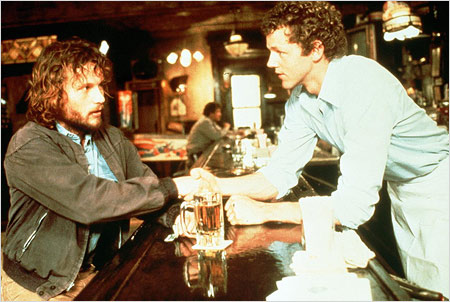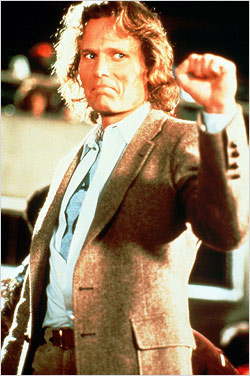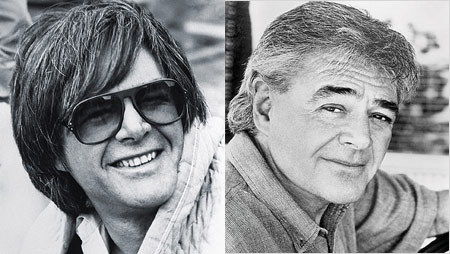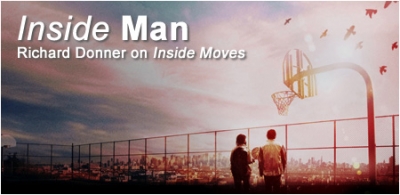RD: Well, the minute I read the script, who else would you want to play that role but a man like that, who won two Academy Awards for the same performance? He was just perfect for it. So I found him. He was in Washington, D.C., I think, working for the Veterans' Administration. We discussed it and he said, "No thanks, I'm not acting. I was only an actor once. I don't want to be an actor." I said, "Well, I have the script. Would you read it?" He said, "Well certainly, I'll read it." So I sent it to him and in the original script, the character was called Hooks. And I got a call from him. He said, "I read your script." I said, "Well, I hope you enjoyed it." He said, "Yes, I enjoyed it and I would like to do it but would you change the name from Hooks to Wings?" I said, "Oh my God... yeah, instantly." He's brilliant. He's gone now.
AJ: What was it like for him stepping in front of a camera for the first time in over thirty years?
RD: None of them are in front of a camera. That was the most familial group of actors I've ever worked with in my life. Max's Bar was built on a street in Echo Park from a garage. You actually walked into a bar. And that bar became the home for all of us, crew and cast. Those people aren't acting. When Stinky says, "Don't be stupid. First you get handicapped. Then you try suicide," and they laughed at it? That was them. That was so real. In that scene, two of the actors were physically handicapped. Bert Remsen (who plays Stinky) was a casting director and a crane on a set toppled and crushed him. He was badly hurt for the rest of his life. And everybody else fell into it. It wasn't acting. I must say I deserve no credit for that film. They all brought it to life on their own.
AJ: That familial feeling you're talking about really comes through in the party scene at the bar on Christmas.
RD: Yeah, I love that. And who better than Sinatra, huh?
AJ: Yeah, that was a perfect choice. You had worked pretty extensively in television before making The Omen. I was wondering if that helped in making something as intimate as Inside Moves?
RD: Well, working in TV helped me in everything. It helped me to know where my energy should go and what you should do, both physical and mental energies, and where you're going to put your camera. So remember I read that book right after The Omen. And I saw that movie (in my head) then. I think anything you do in the industry, whether you make commercials, documentaries, half-hour TV comedies, dramatics, it helps form how you'll work with other people on any movie you do. So yeah, to answer your question in a very roundabout way, yes it did. (laughs)
AJ: Are there any other movies you've made that you'd like to see rediscovered or reevaluated the same way Inside Moves now hopefully will be?
RD: Two of them. I wish there was more play on Ladyhawke, which I love. It's a beautiful, unrequited, true love story. I love it. And one of the most important for me is Radio Flyer. Because of child abuse, the way it was handled and the way it was acted and the way it was brought to life and the way it forced you into your own conclusions. Its subjectivity. I wish that picture had more play and was out again. But that's show biz!
AJ: I'd agree with you on those. The other one I'd mention is Scrooged, which I always thought got kind of overshadowed by Groundhog Day.
RD: (laughs) You know, it still plays every Christmas. You're right. That was a fun picture. It was great. Bill (Murray) was wonderful. The script was amazing. We're so lucky doing what we do. That shoot was memorable to me too and the end result was great. You know, at the very end of it, it's kind of like Slumdog Millionaire. When they start to sing "Put a Little Love in Your Heart". We started to pull back a little bit, just to get in the cast. Then all of a sudden I kept pushing the camera back and back and back, and everybody came in! The crew, everybody that made that movie practically is in that shot in the end with everybody singing "Put A Little Love in Your Heart". And it was true. You didn't have to push them. Everybody had a lot of love in their hearts making that film.
AJ: That's similar to the way you end Inside Moves, with the crew photo underneath the end credits.
RD: Yeah. And I did that on the last Lethal Weapon, too. I had everybody from every single department get photographed. Either bring photographs in or we shot photographs of them. And as the credits roll, there's pictures of everybody. So the unsungs, the people that nobody ever sees, everybody saw their face.
AJ: Would you ever want to make another movie as small and intimate as Inside Moves again?
RD: Sure, if it comes along. If it's right. If it's the perfect script to do, yeah. Without a second's hesitation. But they're tough to find. And they're tough to finance. But if you really believe in them and you just stay with it, it'll happen. Yes. Sure, without a second's hesitation, I'd jump on it.
AJ: You can tell just by talking to you that Inside Moves was an important movie to you.
RD: Very. Very, very, very. And as I said, it's a feel-good movie.
AJ: As somebody who essentially created the modern superhero movie, what's your take on the current popularity of superhero movies?
RD: I think they're great. I think they're really great, the way they're handled today. I have kind of an expert, he's 13 or 14, named Tommy Wenk. He's a young guy, reads all the comics, keeps up on everything, and he tells me. This would make a great movie. That is a great movie. Go see this one, you'll love it. Tommy Wenk is like the decision for me, whether we should go and see a super-movie of today. I think they're pretty damn good, in general. We call it The Tommy Wenk Critique. He makes our decisions for us. He's the audience!
AJ: There have been rumors for awhile about you reteaming with Mel Gibson, either on Lethal Weapon 5 or a movie called Sam and George or something else.
RD: Well, Sam and George is dead. That was at Paramount. That's not happening. But hopefully I'm doing another picture with Mel, probably next year. Maybe prepare it in the fall of this year. But I don't think Lethal's gonna happen. I think it could. I think we have a great story for it. I think one of the other producers who I allowed on the picture may have screwed it up by trying to push me out and that offended Mel. It just got stupid. It became really Hollywood. It became the low end of what Hollywood is. Quite despicable. But Channing Gibson, who's a great writer and wrote Lethal 4, has a great story for both Mel and Danny (Glover) for a fifth one. It's charming. It's a little bit of the original. It ends the way they should end because it's kind of a little bit of a reversion on what it was. It's a good story and maybe, who knows? Maybe after I work with Mel on this one, maybe I can talk him into it. But only time will tell.
AJ: Somebody just glancing at your filmography might think that Inside Moves is an atypical movie for you. How would you counter that?
RD: Well, is Radio Flyer atypical? It's not. There's nothing typical or atypical for me. You read something or you develop something and you want to see it on screen and it becomes the film. It just seems to me that I did those, they were very difficult, very hard to sell, you still keep making them whenever you can and something else comes along. Until those Lethals came along, I had never done an action film. There was always gratuitous bullshit. This one, written brilliantly by Shane Black, had a reason. It had brilliant characters, great development, great evolution of them, and there was a reason the action evolved out of the situation that the characters were in that you cared about. So I wanted to make it. Maybe that's become typical for me, I don't know. I just love making movies, period.
---
Certainly that love is readily apparent in any given Richard Donner picture. Be sure to check out my review of Inside Moves on DVD here. Thanks to Cliff Stephenson at Off the Cliff Productions and Derek Hoffman at The Donners' Company for their help in setting up this interview and special thanks to Dick Donner himself for taking the time to chat with us.




